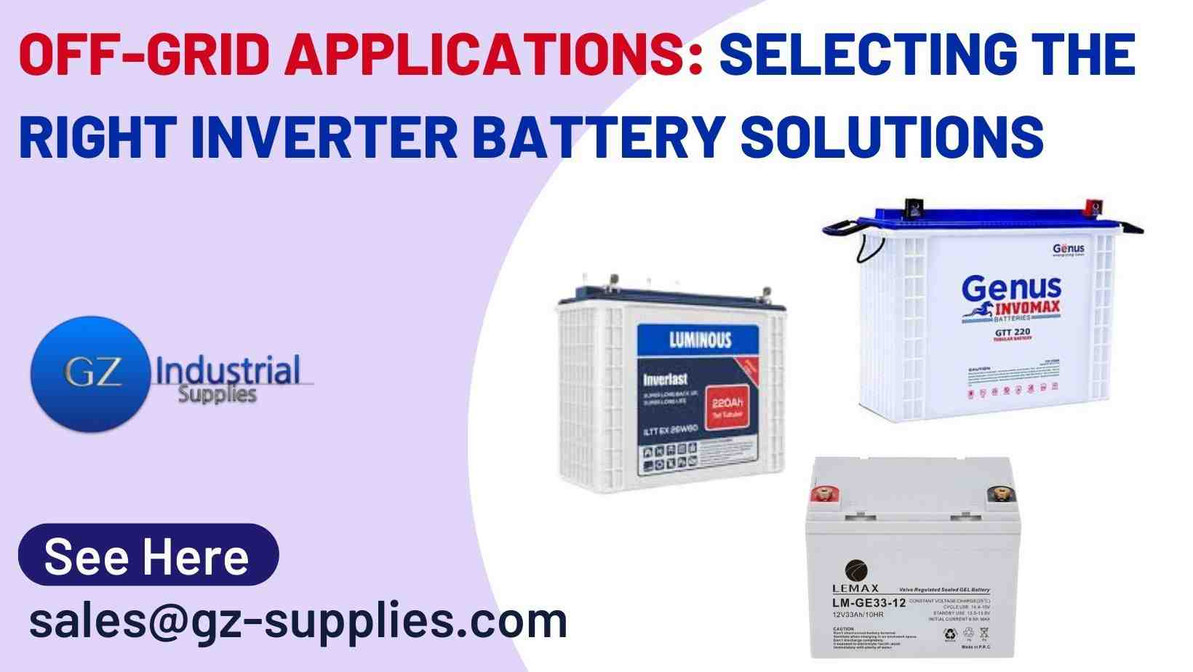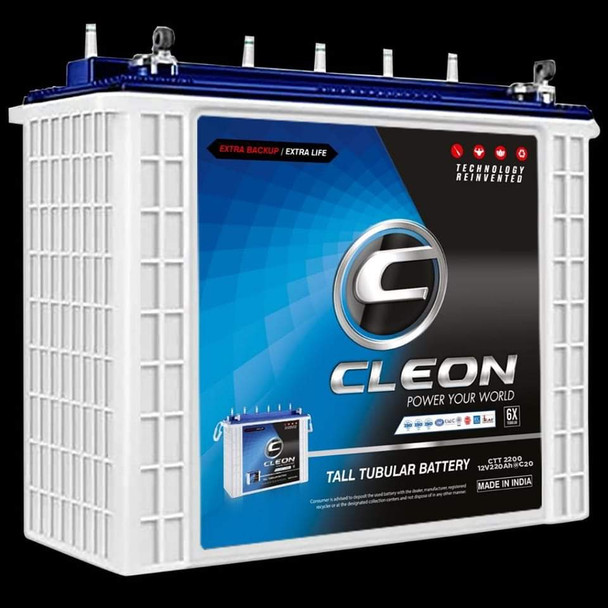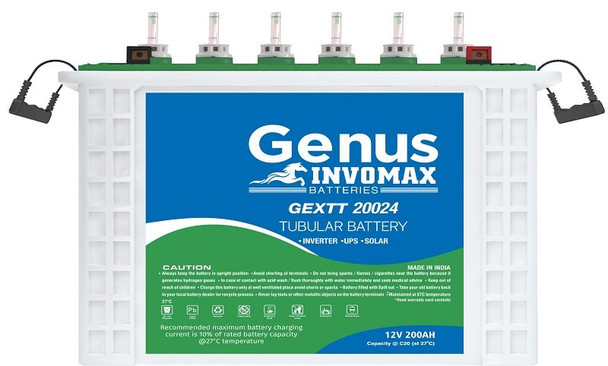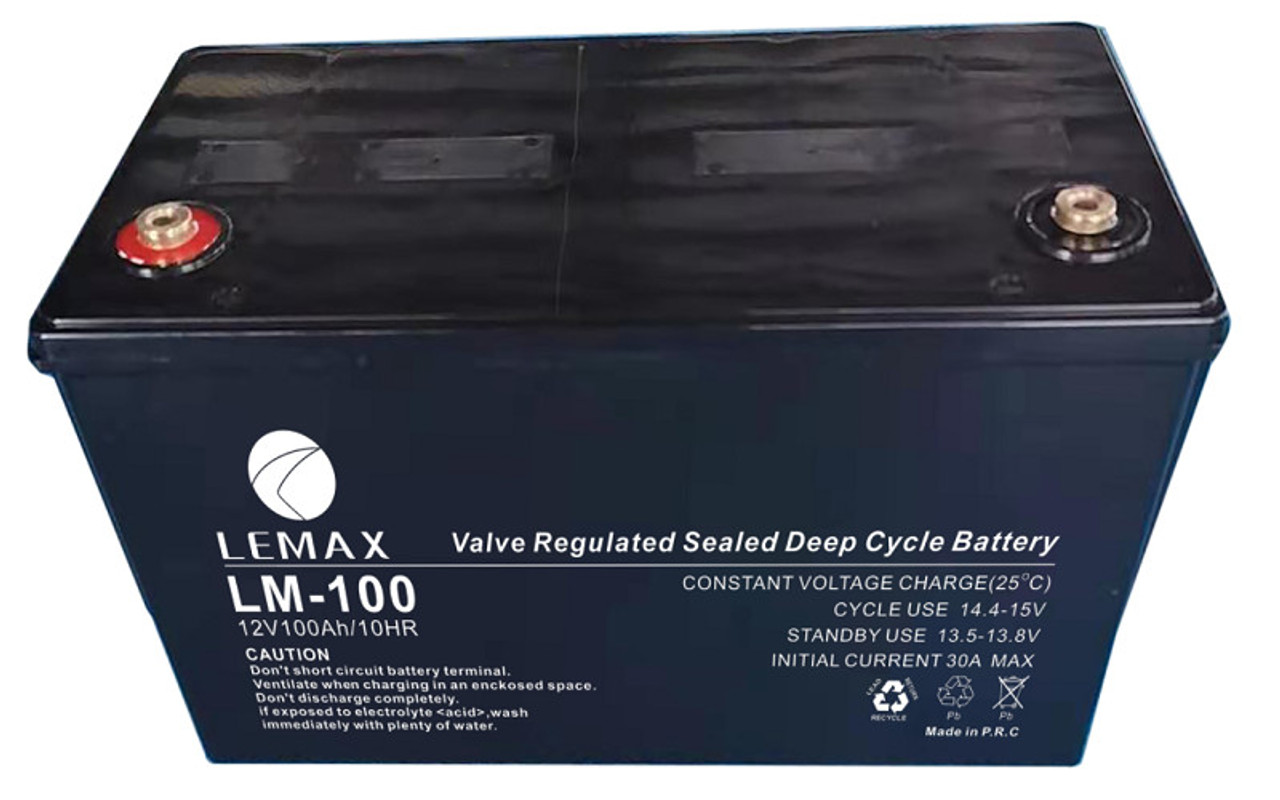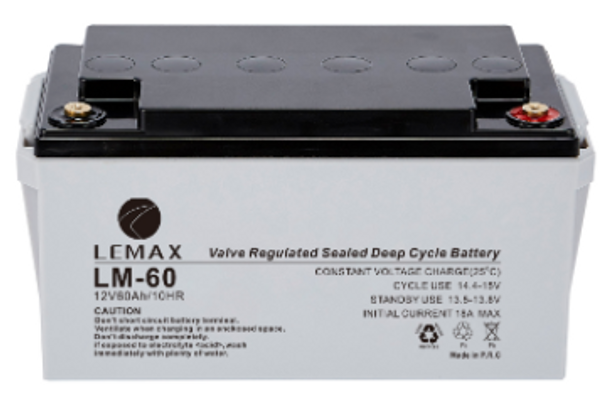Off-Grid Applications: Selecting the Right Inverter Battery Solutions
In remote areas and off-grid locations in Nigeria, reliable and efficient power supply is a constant challenge. In these off-grid applications, such as remote cabins, RVs, boats, and solar-powered systems, selecting the right inverter battery solutions is crucial for ensuring a consistent and sustainable power source. Off-grid environments demand energy storage systems that can withstand the demands of continuous power usage and offer long-lasting performance.
Inverter batteries are an essential component of off-grid systems, acting as the backbone of energy storage. Unlike regular starter batteries, inverter batteries are designed to deliver a steady flow of power over an extended period. These batteries are specifically engineered for deep cycling, allowing them to be discharged significantly before needing recharging. They play a vital role in storing the energy generated by solar panels or other renewable sources, ensuring uninterrupted power supply even during periods of low energy production.
Inverter batteries play a crucial role in these off-grid scenarios by acting as the backbone of energy storage, allowing users to store excess energy generated from solar panels or other renewable sources for later use. The proper selection of inverter battery solutions is essential to ensure uninterrupted power supply, optimize energy utilization, and achieve energy independence in these off-grid applications.
This comprehensive guide will delve into the world of inverter battery solutions for off-grid applications in Nigeria. We will explore the various types of inverter batteries available, the factors to consider when selecting the right one, and the best practices for maintenance and optimization. Whether you are seeking energy independence for your remote cabin or powering your recreational vehicle with solar energy, this guide will equip you with the knowledge to make informed decisions and select the ideal inverter battery solution for your off-grid needs. Let's embark on this journey towards reliable and sustainable off-grid power solutions.
Lean more: The Best inverter Battery in Nigeria 2023
Understanding Off-Grid Applications
Off-grid environments are characterized by their isolation from a centralized power grid. These areas often lack access to reliable electricity, making energy independence a critical concern. Remote cabins, mobile homes, boats, and remote agricultural sites are some examples of off-grid applications. In Nigeria, where the power grid infrastructure may not extend to remote regions, off-grid solutions are becoming increasingly important for providing essential services, supporting economic activities, and improving the quality of life in these areas.
Challenges in off-grid applications include a lack of access to a stable power source, higher energy costs due to reliance on alternative power generation methods, and a dependence on traditional fossil fuels for energy needs. However, off-grid applications also present an opportunity to harness renewable energy sources, such as solar power, and embrace sustainable and eco-friendly energy solutions.
Inverter Battery 220AH/12V - TT Luminous
Inverter Battery Basics
Inverter batteries are a critical component of off-grid systems as they store excess energy produced by solar panels during periods of peak solar generation for use during times when solar generation is low or unavailable. Unlike regular starter batteries, which are designed for short bursts of high-energy output, inverter batteries are specifically designed for deep cycling. Deep cycle batteries can be discharged significantly before needing recharging, making them ideal for long-term energy storage and consistent power supply in off-grid applications.
The primary function of inverter batteries is to convert direct current (DC) electricity into alternating current (AC) electricity, which is the standard form of electricity used to power household appliances, electronic devices, and industrial equipment. Inverter batteries ensure that the energy stored in the battery is readily available for use as alternating current, enabling users to power their devices and appliances seamlessly.
Types of Inverter Batteries
There are various types of inverter batteries available, each with its unique characteristics and performance attributes. The two main categories of inverter batteries are lead-acid batteries and lithium-ion batteries.
A. Lead-Acid Batteries
- Flooded Lead-Acid Batteries: These batteries contain a liquid electrolyte, and they are among the most common types of batteries used in off-grid applications. They are cost-effective but require regular maintenance, including topping up the electrolyte level and ensuring proper ventilation to prevent the release of gases.
- Sealed Lead-Acid Batteries (AGM, Gel): Sealed lead-acid batteries, such as Absorbent Glass Mat (AGM) and Gel batteries, are maintenance-free and do not require refilling of electrolyte. They are sealed to prevent the release of gases, making them safer and more suitable for indoor applications.
B. Lithium-Ion Batteries
- Lithium Iron Phosphate (LiFePO4) Batteries: LiFePO4 batteries are known for their safety, high cycle life, and stable performance. They have a longer lifespan compared to lead-acid batteries and can withstand deep cycling without significant capacity loss.
- Lithium Nickel Cobalt Aluminum Oxide (NCA) Batteries: NCA batteries offer high energy density and power output, making them suitable for applications with high power demands. They are commonly used in high-performance electronics and electric vehicles.
- Lithium Nickel Manganese Cobalt Oxide (NMC) Batteries: NMC batteries strike a balance between energy density and power output, making them versatile and suitable for a wide range of applications, including off-grid solar systems.
Comparing the different inverter battery types allows users to make an informed decision based on their specific needs, budget, and performance requirements.
Cleon Solar and Inverter Tall Tubular Battery 12V 220AH
Factors to Consider When Selecting Inverter Battery Solutions for Off-Grid Applications
When choosing the right inverter battery solutions for off-grid applications, several factors need to be considered to ensure optimal performance, durability, and cost-effectiveness.
A. Capacity and Voltage Requirements
- Calculating Energy Needs and Load Demands: Assessing the energy consumption patterns and load requirements of the off-grid application is crucial for determining the appropriate capacity of the inverter battery. Understanding the daily energy demand and peak load will help size the battery system accordingly.
- Voltage Compatibility with the Inverter and Solar Panels: Matching the voltage of the inverter battery with that of the solar panels and inverter is essential for seamless integration and efficient energy transfer between components.
B. Depth of Discharge (DoD) and Cycle Life
- Understanding DoD and Its Impact on Battery Longevity: Deep cycle batteries are designed to withstand frequent deep discharging and recharging cycles without significant capacity loss. It is essential to understand the recommended depth of discharge for the selected battery type to ensure its longevity.
- Evaluating Cycle Life for Long-Lasting Performance: Cycle life refers to the number of charge and discharge cycles a battery can undergo before its capacity drops to a certain threshold. Longer cycle life indicates a more durable and reliable battery with less frequent replacement needs.
C. Efficiency and Energy Conversion
- Assessing the Efficiency Ratings of Different Battery Types: The efficiency of an inverter battery refers to the amount of energy it can convert during charging and discharging processes. Higher efficiency batteries can maximize energy utilization and minimize energy losses, contributing to cost savings over time.
- Maximizing Energy Storage and Minimizing Losses: Optimal energy storage and minimal energy losses are crucial for off-grid applications, where every unit of stored energy matters. Evaluating the energy conversion efficiency of inverter batteries can help users select solutions that provide maximum energy yield.
Choosing inverter battery solutions that align with these factors will result in a system that is well-suited to the specific off-grid application, providing reliable and efficient energy storage.
Inverter Battery 200AH/12V Invomax Genus
Maintenance and Care of Inverter Batteries
Proper maintenance and care of inverter batteries are essential to ensure their longevity and optimal performance. Regular maintenance practices can significantly extend the lifespan of the batteries and reduce the risk of malfunctions or breakdowns.
A. Best Practices for Maintaining Inverter Batteries
- Cleaning and Safety Considerations: Keeping the battery and its surroundings clean and free from dust, dirt, and debris can prevent the accumulation of heat and extend the life of the battery. Safety measures, such as ensuring proper ventilation and protection from extreme temperatures, should also be observed.
- Monitoring and Troubleshooting: Regular monitoring of battery performance and voltage levels can help identify potential issues early on. Troubleshooting and addressing any problems promptly can prevent further damage and ensure the efficiency of the battery system.
B. Proper Charging and Discharging
- Avoiding Overcharging and Over-Discharging: Overcharging and over-discharging can lead to damage to the battery and reduce its overall capacity. Using a charging controller to regulate the charging process can prevent these issues and prolong battery life.
- Maintaining Proper Charge Levels: Keeping the battery charged within the recommended voltage range and avoiding prolonged periods of undercharging can prevent sulfation and capacity loss.
Inverter Battery SMF 200AH/12V Luminous
Inverter Battery Charging and Charging Controllers
Efficient charging is critical for maintaining the health of inverter batteries and optimizing their performance. Charging controllers are essential components in off-grid systems that manage the charging process and protect the batteries from overcharging and over-discharging.
A. Charging Methods for Different Battery Types
- Constant Voltage (CV) Charging: CV charging maintains a constant voltage during the charging process until the battery reaches its full capacity. This method is commonly used for lead-acid batteries.
- Constant Current (CC) Charging: CC charging maintains a constant current during the initial charging phase to ensure a steady and controlled charging process.
B. Importance of Charging Controllers in Regulating Charging Process
- Preventing Overcharging: Charging controllers automatically reduce the charging current or voltage when the battery is fully charged, preventing overcharging and protecting the battery from damage.
- Preventing Over-Discharging: Charging controllers can disconnect the battery from the load when its voltage reaches a certain threshold, preventing over-discharging and prolonging battery life.
C. Types of Charging Controllers and Their Functions
- PWM (Pulse Width Modulation) Charge Controllers: PWM controllers are a cost-effective option for regulating charging and discharging processes. They are suitable for small to medium-sized solar systems.
- MPPT (Maximum Power Point Tracking) Charge Controllers: MPPT controllers offer higher efficiency and better performance in converting solar energy into usable electricity. They are particularly beneficial for larger solar systems and environments with varying sunlight conditions.
Inverter Battery 12V 100AH Lemax
Inverter Battery Sizing and System Design
Sizing the inverter battery system appropriately is essential for ensuring that it meets the energy demands of the off-grid application efficiently. Proper system design considers factors such as energy consumption, load requirements, and available sunlight to optimize energy storage and utilization.
A. Matching Battery Capacity with Energy Consumption
- Understanding the Energy Consumption Pattern: Analyzing the energy consumption pattern of the off-grid application will help determine the battery capacity required to meet the energy demands.
- Sizing the Battery Bank: Calculating the total energy storage capacity needed and sizing the battery bank accordingly will ensure a reliable and consistent power supply.
B. Evaluating Energy Needs for Off-Grid Applications
- Assessing Load Demand: Understanding the load demand of the off-grid application is vital for determining the number and capacity of batteries needed to support the load.
- Accounting for Daily Energy Requirements: Estimating the daily energy requirements and factoring in seasonal variations can help size the battery system for optimal performance throughout the year.
C. Optimizing the Inverter Battery System for Maximum Efficiency
- Configuring the Battery Bank: Configuring the battery bank in parallel or series can affect the system's voltage and capacity. Understanding the advantages and limitations of each configuration can aid in system optimization.
- Considering Charging and Discharging Patterns: Evaluating the charging and discharging patterns will help optimize the use of renewable energy and maximize battery life.
Rechargeable Solar Inverter Battery 12V60AH Lemax
Budget Considerations and Return on Investment (ROI)
Cost is a significant consideration when choosing inverter battery solutions for off-grid applications. Balancing cost with quality and performance ensures a cost-effective investment that provides long-term benefits.
A. Setting a Budget for Inverter Batteries and Off-Grid Systems
- Identifying Budget Constraints: Defining a clear budget for the inverter battery and the overall off-grid system can narrow down the options and prevent overspending.
- Allowing for Long-Term Savings: Considering the potential savings in fuel costs and electricity bills over the life of the inverter battery can justify higher initial investments in more efficient and durable batteries.
B. Balancing Cost with Quality and Performance
- Assessing the Total Cost of Ownership: Calculating the total cost of ownership, including maintenance and replacement costs, can provide a more accurate representation of the long-term value of the inverter battery.
- Evaluating the Value Proposition: Considering the benefits, features, and performance of each inverter battery model in relation to its cost can help users identify the best value proposition.
C. Calculating ROI for Different Inverter Battery Options
- Estimating Payback Period: Estimating the payback period for the investment in inverter batteries can help users determine the financial viability of the selected solution.
- Factoring in Environmental Benefits: Considering the positive environmental impact of using renewable energy and reducing greenhouse gas emissions can add value to the investment.
Ride Plus Tubular Inverter Battery 200AH
Making the Final Decision
With a comprehensive understanding of the factors to consider and the various options available, users can make an informed decision in selecting the most suitable inverter battery solution for their off-grid application.
A. Assessing Compatibility with Specific Off-Grid Applications
- Tailoring the Selection to Specific Needs: Evaluating how well the inverter battery solution aligns with the unique requirements of the off-grid application is crucial for ensuring its effectiveness.
- Ensuring Scalability: Considering the potential for future expansion or modifications to the off-grid system can influence the choice of inverter battery.
B. Weighing Factors and Prioritizing Based on Individual Needs
- Identifying Top Priorities: Prioritizing factors such as capacity, cycle life, efficiency, and budget can guide users towards the most suitable.
Related Article;
Where to Buy Inverter Battery in Nigeria
The Best Inverter Battery in Nigeria 2023 Reviews
Why Use Distilled Water For Inverter Battery
Conclusion
The selection of the right inverter battery solutions for off-grid applications goes beyond just meeting power requirements; it is an investment in sustainability and energy independence. By embracing renewable energy sources and utilizing efficient inverter batteries, off-grid systems can significantly reduce their reliance on fossil fuels, lower carbon emissions, and contribute to environmental preservation.
Efficient and reliable inverter batteries not only ensure continuous power supply but also improve overall energy utilization and cost-effectiveness. Choosing the appropriate battery capacity, understanding the depth of discharge, and optimizing the charging process are key factors in maximizing the battery system's performance and longevity.
Moreover, by considering reputable brands, reading customer reviews, and seeking expert advice, users can gain valuable insights into the real-world performance of different inverter batteries. This information can help users make well-informed decisions and select a solution that meets their specific requirements and budget constraints.
As technology continues to advance, new innovations and advancements in inverter battery technology are expected. Keeping abreast of the latest developments can present users with even more options for efficient and sustainable off-grid solutions.
In conclusion, selecting the right inverter battery solutions for off-grid applications is a critical decision that requires thorough research, careful evaluation, and consideration of individual needs. By assessing the factors outlined in this guide and making informed choices, users can establish robust and reliable off-grid systems that contribute to a greener and more sustainable future. Embracing renewable energy and efficient inverter battery solutions empowers individuals, businesses, and communities to take charge of their energy needs and create a cleaner and more resilient world.
Recent Posts
-
The Best Electrical Wire in Nigeria 2025 (Updated)
Introduction Electrical wires are the basic unit of every electrical system. Electrical wires a …Apr 14, 2025 -
What are Agricultural Machinery
Introduction Agricultural Machinery is also used to improve the wide range of production practi …Apr 14, 2025 -
DIFFERENT TYPES OF WATER PUMP AND THEIR APPLICATION
Introduction There is a wide variety of water pumps available to suit many different purposes a …Apr 11, 2025

